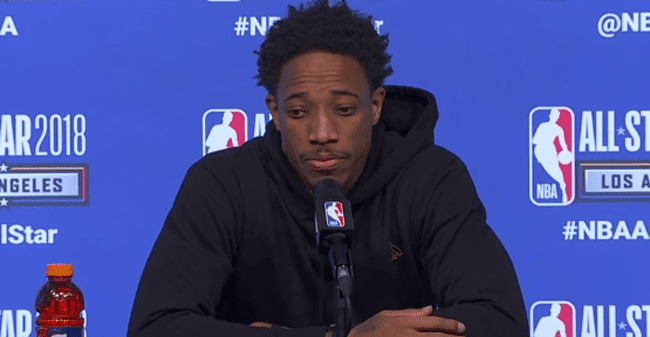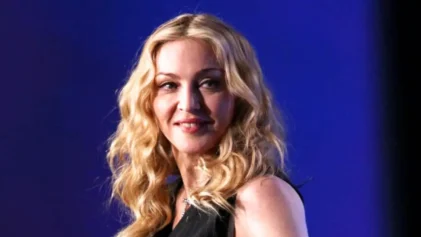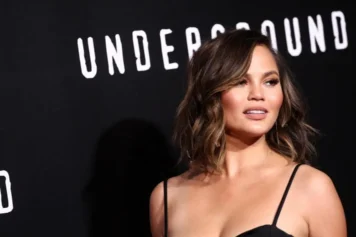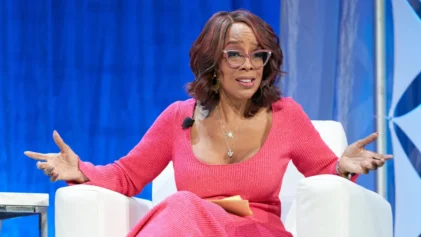
YouTube
Millions of dollars in the bank, worldwide fame and living out a lifelong dream. The NBA star and shooting guard for the Toronto Raptors DeMar DeRozan can list all of those things as accomplishments, but none of them has kept him from being depressed.
During this year’s NBA All-Star weekend, the 28-year-old sent a tweet in the middle of the night, which gave many a first glimpse into his longtime battle with the mental disorder. “This depression get the best of me,” he wrote, which sparked a lot of positive words from fans and folks in general.
This depression get the best of me…
— DeMar DeRozan (@DeMar_DeRozan) February 17, 2018
As many know, this year’s NBA All-Star weekend took place in Los Angeles, DeRozan’s hometown, so many figured he would be in high spirits, seeing he got to spend time with family and friends and play in front of them.
But that obviously wasn’t the case, and in a recent interview, he spoke about his battle with depression and how he’s now able to discuss it openly.
“It’s one of them things that no matter how indestructible we look like we are, we’re all human at the end of the day,” he told the Toronto Star. “We all got feelings, all of that. Sometimes it gets the best of you, where times everything in the whole world’s on top of you.”
The 6’7” DeRozan, who’s the leading scorer of his team, said he’s had many nights similar to the one he had on All Star weekend when he sent that cryptic tweet. In fact, his quiet personality was shaped by his depression, since much of his thinking time was occupied with trying to combat sad feelings.
“I always have various nights,” he explained. “I’ve always been like that since I was young, but I think that’s where my demeanor comes from. I’m so quiet, if you don’t know me. I stay standoffish in a sense, in my own personal space, to be able to cope with whatever it is you’ve got to cope with.”
There have been some researchers who’ve found a correlation between depression and people who are very successful, and that link has a lot to do with ambition, said Raj Raghunathan, PhD., a professor at the McCombs School of Business at The University of Texas at Austin.
In his book “If You’re So Smart, Why Aren’t You Happy?” he said that a lot of successful people thrive in competition and trying to be the best is what actually fuels them. But the more they compare themselves to others, the more of a chance they’ll feel empty.
“This means that regardless of how wealthy, famous, powerful or attractive you are compared with others, the more you strive for superiority, the less happy you will be,” Raghunanthan wrote.
Other professional athletes who’ve admitted to suffering from depression or mental illness include former Major League Baseball player Darryl Strawberry, retired NFL player Ricky Williams, former NBA player Keyon Dooling and the WNBA’s Imani Boyette.
The former NBA player Royce White also admitted to mental illness and said he suffered from bad anxiety disorders. So in his rookie year with the Houston Rockets, he pressured the league to create an official policy to help him and others like him.
But despite his efforts, an official policy wasn’t set up and White sat out the entire 2012/2013 season. He now plays in Canada’s NBL league for the London Lightning, and there still isn’t anything in place for the players.
Besides White, the NBA player who may be most associated with the issue of mental health in professional basketball is former Milwaukee Buck Larry Sanders, who walked away from the league after playing for five years. At the time, he said his decision to quit had to do with “personal reasons.”
During a 2015 interview, Sanders said it’s hard for a lot of professional athletes to cope with their newfound fame and wealth because they’re still young and their brains are still developing.
“People don’t take into account that we’re all very young men,” Sanders said. “Scientifically, the brain doesn’t stop developing. A guy comes into the league and it’s nine or 10 years before his brain stops developing, for them to be settled with their true emotions, their cognitive reasoning, their rationality. This is the last thing to develop.”
“But we’re put into these positions where we’re put on a pedestal,” he added. “But chemically, we’re not even fully developed yet … Everything at once, family, home, life, then being a professional who has to perform on the court. It’s intense.”
It’s possible that DeRozan opening up about his depression will put more pressure on the NBA to deal with mental illness head on.
Some say the reason why progress has been so slow has to do with confidentiality because the issue is so private and personal, there hasn’t been a huge collective voice among players.
In DeRozan’s interview, he said if there’s one bright side to his condition, is that he’s extremely cognizant of how he treats people.
“This is real stuff,” he said. “We’re all human at the end of the day. That’s why I look at every person I encounter the same way. I don’t care who you are. You can be the smallest person off the street or you could be the biggest person in the world, I’m going to treat everybody the same, with respect.”
“My mom always told me: Never make fun of anybody because you never know what that person is going through,” added DeRozan. “Ever since I was a kid, I never did. I don’t care what shape, form, ethnicity, nothing. I treat everybody the same. You never know.”
The hoop star also said that he isn’t embarrassed about his depression.
“It’s not nothing I’m against or ashamed of,” stated DeRozan. “Now, at my age, I understand how many people go through it. Even if it’s just somebody can look at it like, ‘He goes through it and he’s still out there being successful and doing this,’ I’m okay with that.”


